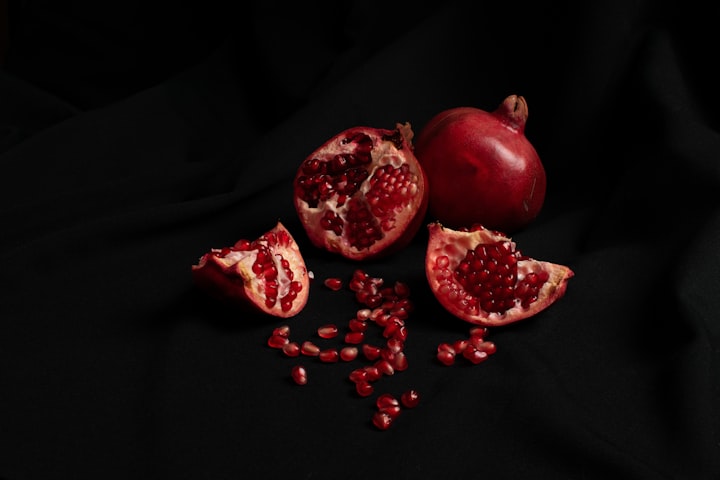Things are colder, now.
Mothers and daughters, strawberry juice and pomegranate seeds.

It aches to love her. In every breath, in each day that passes, I think about our fates — rooted in flesh and fruit and blood — and rend myself anew. I think about her entry into this world. When she slipped from me, red and screaming, in the depths of that great, golden garden.
I remember it all.
The swell of pain, knife-sharp and shuddering until you cannot bear it any further, twisting, howling, heels set to the mud and crying out for the girl who only wanted to feel the grass beneath her feet.
I was sobbing long before she was laid at my breast.
“It’s a girl,” one of the Meliae whispered. Her knarl-knotted fingertips were the first to grasp my daughter, wrapping her strawberry limbs up in linen (a month prior, the wind had caught it from the line of a farmer’s wife and swept it into the branches of the nymph’s ash tree) — and pressed her to me.
Oh, to cradle something wholly yours.
The world is laid at your feet. Peppered with the temptation to crush that tiny fist, those sapling-fingers curling around a thumb. Nothing but perfection, god-sweet and terrifying. I still see the flash of dirt under my nails.
On some nights, the bad ones — even millennia on — I can still feel the sting of it in my fingertips. Scrabble. Dig. Gasp.
The ache settles. The Meliae have crowded elsewhere, gone to tell the Gods of their newest squalling addition, fighting to be the first to congratulate them (him) of a child borne of such fertile bounty.
But further down the mountain, hidden in lush green, she sleeps soundly in my arms. My sorrow grows wild at the sight of that peaceful face. It bears teeth.
I would kill for her, I think.
All the wheat in the half-lit grove quivers.
Blood still seeps from between my thighs. And in the great, golden garden of Olympus, the whole harvest withers with rust.
...
I call her Koré. And she wants for nothing in the home and fields cultivated just for her.
Together we visit the temples ripe with offerings in exchange for my toil, her nimble fingers picking grapes and smearing strawberry juice around that sweet mouth — reaching for me to carry her once she’s full. A ripe fruit, heavy with seeds, drops from her sticky grip. It splits on the marble and scatters its bounty like a sacrificed heart.
We leave it for the women celebrating Thesmophoria to attend.
Part of me aches again.
I used to flinch from her expectant arms, right at the beginning, when we were still new to each other. The idea of just… putting her down and continuing my work, as I have always done, became a sickly comfort to me.
My brain whispered that she would take root, as all small plants have done within the care of Demeter. I could steer her from a distance, give her to a kind shepherding family — maybe even appear to her in a dream or two as she grew older. When I was older, too. When I would be ready.
I can’t say what altered. Perhaps it was the realisation that my sweet girl didn’t cry once in those early days, even in the face of my weak mothering. Or when she produced her first flower, toddling over on legs like bandied pumpkin stalks to show me. It may have been the time I washed her skinned knees in the river and felt the first vestiges of strength come to me. The surety that I could provide for us both, that we would live happily and she would know a full childhood. Nothing like mine.
I shrugged the last scraps of youth from my back and watched as they tangled in the reeds downstream.
...
Godhood makes quick work of children.
Within a year Koré had grown tall and slender, her hair long and flaxen down a dancer’s back.
She refused to come inside unless it was for meals — and even then her seat had to be next to the wide window that overlooked the creek and allotment made in her wishes. Her craft was budding but strong, and by the following year she would take over some of my duties in sparking springtime for the people.
Some mornings I would wake up and find her bed empty, ice seizing my lungs and skittering across our homestead — only to find her knee-deep in the water.
The river nymphs had taken to Koré’s easy chatter with a voracious appetite — I never bothered to make idle small talk, much to their displeasure — and would indulge her questions about what was downstream. The oceans and the funny wooden ships that mortals used to navigate the globe. What beasts lurked in the deep and which heroes had battled them and survived.
Sometimes they offered up pieces of gossip from Olympus.
“They have taken to calling you Persephone,” one whispered. “Persephoneia. Persephatta. The humans have started dedicating their grain harvests to you.”
My daughter’s brow furrowed as she tasted her new name. The nymphs crowed in delight, chanting it so loudly that it mingled with the rush of water. With every repetition she seemed to burn brighter, hair glowing in the sunlight, her own laugh lifting the breeze.
She was so beautiful. And it scared me.
I had to watch her name — the one I gifted her at birth — become foam in the same river that took my youth.
Koré. Maiden. No more.
Ice clawed up my throat. That night, while Kor- Persephone slept, I went into the garden and rooted my hands as deep they could go in the silt. The nymphs screamed at me to stop, pulling at my hair and ankles in trembling desperation. My hands came out blackened and bloody, dripping river grass and grit with each step.
Even with my honeyed blood, the frostbite took hours to abate.
But when morning broke — my daughter took her first shaky steps on frozen ice. Her glee made it easy to forget about the nymphs and their thin mouths, stoppered under the water with tales of a world beyond our garden gate. Not even Olympus could touch us here.
...
I adorned the crown of her head with gypsophila. She had managed that spring with her own delicate hands, nurturing a burgeoning harvest that would sustain mortal stomachs and affections come Autumn.
My heart has become hardened against the pleas of most things over the years: from imploring invitations my siblings send in all their lofty splendour to the pitiful begging from humans down below.
But for Persephone? I felt nothing but pride.
She was dutiful and respectful. On colder nights, we’d sit by the fire and talk at length about the stars, of which fruits to nurture and what to bake. Occasionally she would ask me questions about Olympus.
I’d relented many nights ago, gently weaving a bedtime story in which Demeter simply wished to raise her child in peace, creating a home for them both. That the baby was born of love and her mother felt no pain, and was only saddened when she realised the father could not join them on their heavenly mountain.
“So… who was he?”
My sisters were always better at spinning. They could stitch pretty little fibs into their work and make something so beautiful, you’d forget all about the rot in the world.
“He was a shepherd. A good man.”
This kernel of knowledge excites her. She practically crawls into my lap, her sweaty hands knotting mine to ask questions about men and love an-
She has his eyes. I can only see it when she’s this close, practically swapping breath.
Her mouth splits into a grin and it’s suddenly too much — she’s too close — my mind rippling with mud sting nails bramble that I rip my hand from hers.
Persephone jumps back as if burned.
Even hours after, my daughter does not move. From my room I can still see the guilty sag in her shoulders, silhouetted against the fire.
She does not ask me about him, or my life before us, again.
...
There are certain days where I can easily recall the ache. How deep she felt, rooted under my ribs, her tiny feet pressing against my insides with each breath.
Sometimes I’ll sit under the orchard in our garden — now mine again — and watch the dryads shake apples from their hair. My mind drifts to the pain. How this child came to be. How easily she settled, cursed bounty, and how our fates are intertwined forever.
She left an hour ago. The trees are already looking forlorn, expectant of my punishment, and I can feel the ice creeping back under my nails. But I wait a little longer. Exhaustion has settled like a heavy cloak over my bones.
I feel ugly. I feel old.
There have been many nights where I have screamed into the abyss of night, damning them all, clawing at the Earth until tremors toppled cities on the other side of the world. Many died. But I did not care.
I would have dug until Tartarus itself split wide — like the skin of that damned pomegranate — and pulled my daughter out with bloodied hands.
When the frost was thickest and humans died huddled up in droves, my mind whirled with her betrayal.
How did I raise a… thing … so selfish? So cruel?
In my anger, I begged The Fates to sever us forever. I pleaded with them to cut the golden cord that once melded Persep- no, Koré, to me. Anything to stop my love, now blistering with anger and shame, from taking further root.
Let me start anew. Let me fulfil the future that should have been mine. Let me wear a crown and bear a King’s brood and be miserable in my godhood on Olympus once more. Let me know nothing of love.
A magpie croaks in the clearing. Its wings are midnight-black but the plumage shifts brilliant blue in the setting sun.
The colour of my girl’s eyes.
...
It has been a long winter. One of the harshest in human memory — although that is nothing but a pinprick to us — and my fingers do not turn blue. They have become used to such cruel work.
The world spins on. An unending cycle of root, wheat, chaff, wither — and I am alone.
Mother to all. Mother to none.
Sometimes, when the night is quiet and the snow is still, I can hear her laughter. It bubbles up from beneath the brook, winding through the pond-muck… and I hate her.
Then I take myself inside, like the old woman I am, and sit by the fire with my shame. It has been so long since I held my daughter.
She returns in springtime — you know the stories — and graces the entryway of the house we once called home.
“Mother.”
Her eyes, darkened by smoke and the wormy glow of The Underworld, are unreadable to me now. She comes to me bathed in black silks, the colour of rare Turkish roses. Gold thread winds around her hair and waist.
She carries a clutch of white lilies, the perfume rolling off them in waves. Asphodel blooms, death still sticking to their waxy petals. If we were both younger, I may have once considered them to be a peace offering — an attempt to waver my furious temperament — but those days are long gone.
I take them. The stamens glow saffron orange in my grasp, pulsing with life, reflecting what I think is a flash of awe on her face. When I rise from my inspection, she wears steely indifference once more.
My daughter is a Queen. And a wife. She is now a mother herself, too.
Everything I ever was and more.
“Persephone.”
For the months she is with me, she basks in the sunlight. Her work is done with little effort these days — as old and practised as we are — so for the rest of the time she swims, weaves, even stuffs oddities such as pinecones and seashells in her pockets. She inspects each one with fresh glee, holding them to the light.
I can still see her from my room.
“Are you finding things to show him?”
Persephone gasps and the shells clatter in panicked fingers. As she turns to face me, I am struck with how young she looks: cheeks flushed with embarrassment and mouth pouted. The ghost of sweet juice lingers for a moment.
And then — snatched from our meadow — she is gone.
“I am.” The Queen replies. A door closes.
Strawberry juice. Pomegranate seeds. They’re all the same to me.
About the Creator
Lauren Entwistle
Girl wonder, freelance journalist and writer-person. Also known as the female equivalent of Cameron Frye from the 1989 hit, "Ferris Bueller's Day Off.'






Comments
There are no comments for this story
Be the first to respond and start the conversation.